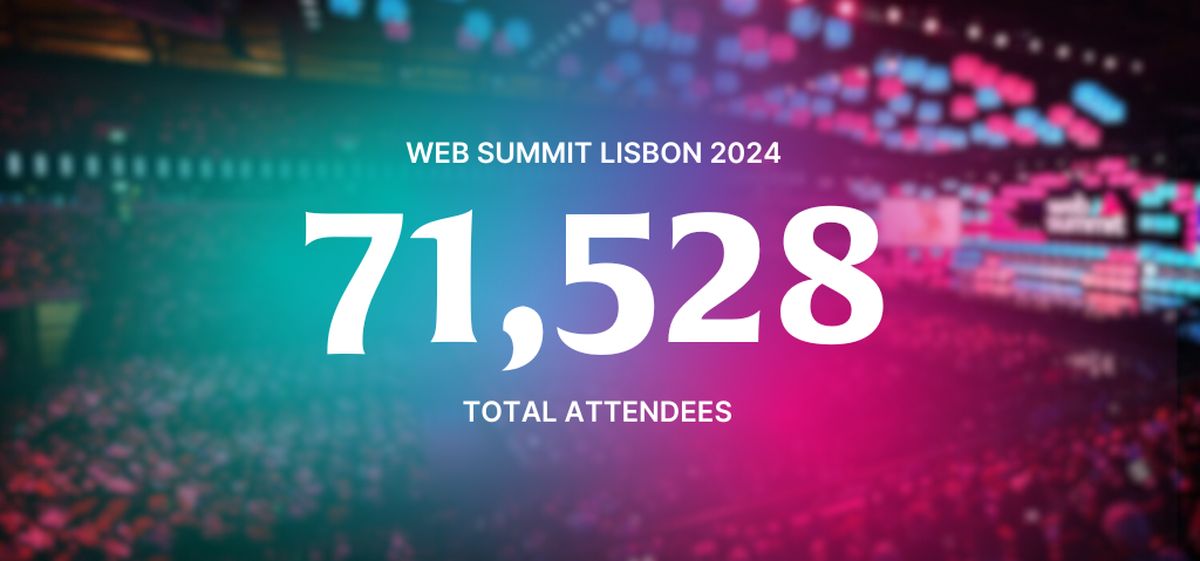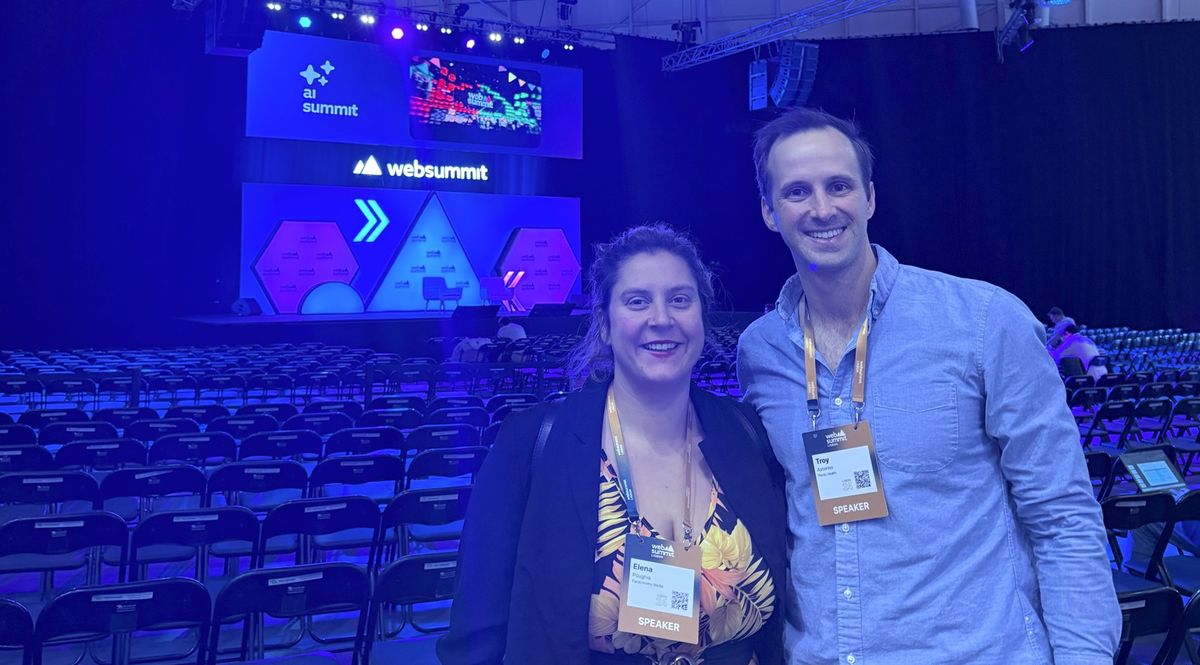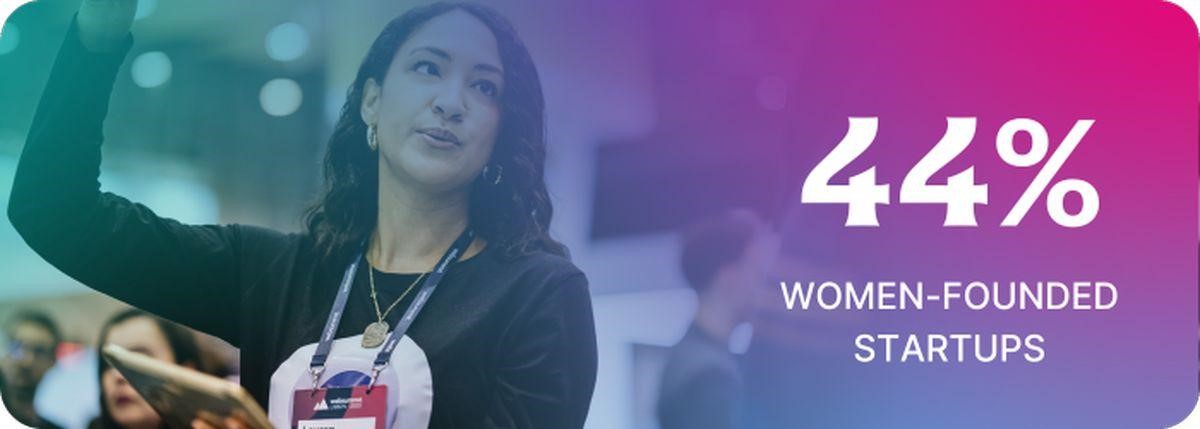and the distribution of digital products.
Highlights from Web Summit 2024

Since founding in Dublin in 2009, Web Summit has grown from a small 150-person conference into a global platform, connecting over a million business professionals, entrepreneurs, and thought leaders. At its core, Web Summit serves as a hub where CEOs, founders, investors, politicians, and cultural figureheads converge to exchange ideas and forge collaborations. The 2024 event carried forward this mission, with attendees delving into critical topics such as AI, sustainability, and emerging technologies. With its flagship conference in Lisbon each November and events hosted worldwide, including Rio, Vancouver, Qatar, and Hong Kong, Web Summit has solidified its role as a global convener of technology and innovation.
Web Summit is about driving impact. Its dedication to the UN Sustainable Development Goals (SDGs) was evident in initiatives like eliminating single-use plastics, redistributing food waste through Zero Desperdicio, and showcasing climate solutions on the planet: tech stage. Programs such as the Indigenous Attendee Program and Women in Tech initiative highlighted Web Summit’s commitment to diversity, equity, and inclusion, with women now comprising 42% of attendees—a significant leap since 2013.
The vibrant discussions and gatherings at Web Summit 2024 extended well beyond the main stage. Among these, a standout was the Female Founders & Investors Dinner, a prime example of the event’s ability to strengthen connections and ignite transformative ideas.

The sessions were equally remarkable, offering insightful conversations that delved into the opportunities and challenges shaping the future of tech and innovation.
Gamechanger or gimmick? Balancing AI hype with product integrityIn the session titled “Gamechanger or gimmick? Balancing AI hype with product integrity,” I had the pleasure of joining Pablo Ruiz-Múzquiz, CEO of Penpot, to tackle the pressing issue of AI hype overshadowing core product values. I asked him “Penpot has been a trailblazer in bridging design and engineering through open-source. As companies feel pressured to incorporate AI, what concerns do you have about the AI hype affecting companies like yours and others?” His perspective offered valuable insights into balancing innovation with core values.
One of the key takeaways was the cultural impact of the AI rush. Companies often risk eroding their product-building culture in pursuit of short-term AI gains, leading to a decline in quality and customer satisfaction. Pablo emphasized that the focus on AI should not come at the expense of integrity and cohesion. He shared observations of companies sacrificing their core strengths to chase AI trends, cautioning against such missteps.
Pablo highlighted the growing importance of open-source AI. He predicted that within three years, 80% of AI technologies will be open source, fostering a more collaborative and transparent ecosystem.
The next generationIn a fireside chat titled “The next generation,” I joined Cristina Vila, CEO and Founder of Cledara, to explore the seismic shifts AI is bringing to the SaaS industry. I asked Cristina, “Some believe that AI could eventually replace traditional SaaS models. From your perspective as a SaaS founder, do you think AI poses an existential threat, or is it an opportunity for SaaS?” Her response illuminated the evolving relationship between AI and SaaS and provided valuable strategies.

One key insight was Cristina’s view of AI as both a disruptor and an enabler. While AI presents challenges, particularly in automation and predictive capabilities that could replace some traditional SaaS functions, it also opens up opportunities for creating more personalized and efficient software solutions. Cristina emphasized the importance of adaptation, encouraging SaaS companies to integrate AI in ways that enhance user experience and optimize operations.
Cristina stressed out the ethical challenges of AI adoption, such as maintaining transparency and data privacy. She stressed the importance of diversity and sustainability in shaping the future of SaaS, arguing that diverse leadership teams are better positioned to drive responsible innovation. There’s a growing need for SaaS companies to embrace adaptability, prioritize customer value, and embed ethics into their AI strategies.
How will AI help reinvent Health Tech?In the session “How will AI help reinvent Health Tech?” I had the opportunity to moderate a discussion with Troy Astorino, CTO of Picnic Health, about how artificial intelligence is reshaping healthcare. The discussion centered on how AI enhances efficiency for medical practitioners, tackles privacy concerns, and addresses regulatory challenges in handling sensitive patient data.

One of the session’s highlights was PicnicHealth’s innovative approach to healthcare, particularly its virtual clinic and site offerings. These AI-driven services provide patients with access to a universal patient record, enabling clinician-guided support for managing health more effectively. By analyzing curated patient histories, identifying care gaps, and offering actionable insights, PicnicHealth demonstrates how AI can transform care management into a more cohesive and efficient experience. The ability for patients to directly interact with clinicians further personalizes this process, fostering trust and better outcomes.
On the research side, PicnicHealth’s virtual site enables life sciences organizations to streamline observational research. By synthesizing medical records and gathering endpoints not captured in routine care, it unlocks new possibilities for studies while maintaining rigorous ethical and scientific standards.
However, Troy also highlighted challenges. Privacy remains a central concern, as AI relies on sensitive data to deliver its transformative potential. Regulatory hurdles, particularly in regions with stringent data protection laws, complicate the deployment of such innovations. Additionally, the rise of AI healthcare startups has sparked a race for early advantage, adding competitive pressure to the ecosystem.
Europe’s most innovative cities: iCapital Awards 2024-25The 10th edition of the European Capital of Innovation Awards (iCapital), hosted in Lisbon during the Web Summit 2024, celebrated cities driving transformative change through innovation. With categories highlighting established and rising innovators, the awards recognize the vital role cities play in shaping their local ecosystems and addressing global challenges through ingenuity and forward-thinking initiatives. Here are the winners and their achievements.

Iliana Ivanova, Commissioner for Innovation, Research, Culture, Education and Youth, said:
“I warmly congratulate Torino and Braga on winning the 2024-25 European Capital of Innovation Awards. They show that innovation is not just about technology but about creating opportunities, fostering inclusion and improving the quality of life for citizens. The winners and finalists are transforming ambition into action, setting inspiring examples of innovation on the ground in Europe and beyond.”
The European Capital of InnovationCities leading the way in innovation and redefining urban ecosystems for the future.
Winner: Torino (Italy)Torino has emerged as a global leader in innovation, transforming from Italy’s industrial capital to a hub for technological, social, and environmental advancements. By addressing challenges in climate resilience and urban mobility with an open innovation strategy, Torino showcases how cities can blend heritage with forward-thinking solutions.
2nd Place: Espoo (Finland)Espoo’s decentralized innovation model fuels Finland’s startup ecosystem, enabling growth across multiple sectors. As a city that embraces diversity and accessibility, Espoo continues to set an example in fostering young talent and building a sustainable future.
3rd Place: West Midlands (United Kingdom)The West Midlands combines its industrial legacy with modern innovation in Healthtech, Cleantech, and Digital Creativity. Supported by world-class universities and science parks, the region is driving economic and societal transformation across its interconnected cities.

Cities paving the way for sustainable, inclusive, and entrepreneurial urban futures.
Winner: Braga (Portugal)Braga’s focus on sustainable growth has turned it into a dynamic economic hub, doubling its exports while creating thousands of jobs annually. The city exemplifies how innovation can integrate cultural richness, social inclusion, and economic development.
2nd Place: Linz (Austria)Linz’s transformation from an industrial stronghold to a vibrant innovation hub is powered by citizen-centered approaches and a fusion of art, science, and technology. Its forward-looking ecosystem is a model for responsible urban innovation.
3rd Place: Oulu (Finland)Oulu combines northern resilience with cutting-edge research and entrepreneurship. Its ICT expertise, vibrant startup ecosystem, and commitment to innovation have made it a leader in fostering advancements that impact billions worldwide.
More from Web Summit 2024The meetups and side events at Web Summit 2024 drew focus to the crucial role of cross-sector collaboration in driving innovation across Europe.
A key focus of the discussions was bridging gaps in regulation, funding, and implementation to empower startups to succeed. Regulatory challenges, such as GDPR and cookie compliance, were highlighted as significant barriers. While designed to protect user privacy, these frameworks often lack practical application, leaving users overwhelmed by repetitive consent prompts they seldom understand. Attendees stressed the need for regulatory reforms that strike a balance—protecting user rights while remaining practical for businesses to implement and encouraging, rather than hindering, innovation.
Another critical theme was the integration of private investment with public funding initiatives. Programs like the European Innovation Council (EIC) fund, which provides significant financial backing for deep tech projects, were lauded for their role in de-risking private investments. By working together, public institutions and private investors can create a more robust funding ecosystem, enabling startups to scale faster and more sustainably. Discussions also explored the value of trusted investor networks, designed to streamline processes and enhance resource accessibility for emerging companies.

These meetups transcended traditional networking, serving as key moments to redefine Europe’s innovation ecosystem. They sparked open dialogue across sectors, highlighting the critical need to harmonize regulations with industry realities and to channel financial resources into transformative ideas.
They reinforced a simple truth: meaningful progress comes from a well-connected ecosystem, where collaboration is the driving force behind impactful, scalable solutions.
Web Summit 2024 saw an unprecedented gathering of investors, with 1,066 representatives managing $14.7 trillion in assets under management. These investors facilitated thousands of meetings with early-stage startups and one another, solidifying Web Summit as a critical catalyst for funding and growth in the tech world. With 3,050 companies exhibiting on the event floor—44 percent of which are women-founded—Web Summit showcased the diversity and depth of the global tech ecosystem.
- Home
- About Us
- Write For Us / Submit Content
- Advertising And Affiliates
- Feeds And Syndication
- Contact Us
- Login
- Privacy
All Rights Reserved. Copyright , Central Coast Communications, Inc.